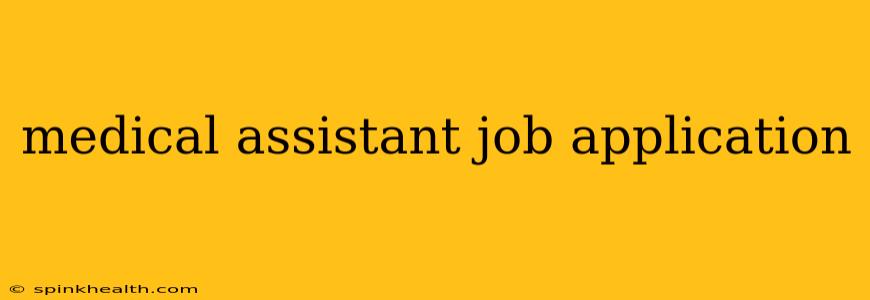Landing Your Dream Medical Assistant Job: A Step-by-Step Guide
The world of healthcare is a dynamic and rewarding field, and for many aspiring medical professionals, the role of a medical assistant (MA) serves as the perfect entry point. But landing that coveted job requires more than just a certificate; it demands a strategic approach to your job application. This isn't just about filling out a form; it's about crafting a narrative that showcases your skills and passion, captivating potential employers and leaving a lasting impression.
Let's embark on this journey together, exploring the key aspects of a successful medical assistant job application, from crafting a compelling resume to acing the interview. We'll cover everything you need to know to transform your application from just another submission into a standout contender.
What skills and experience should I highlight on my resume?
This is where you weave your professional narrative. Think back to your training, previous roles (even volunteer work!), and any relevant experiences. Employers are seeking individuals with a blend of hard and soft skills. Highlight your proficiency in:
-
Clinical Skills: Phlebotomy, vital signs measurement, electrocardiogram (ECG) interpretation, medication administration (if certified), assisting with examinations, sterilization techniques. Quantify your accomplishments whenever possible. For instance, instead of saying "Proficient in phlebotomy," say "Successfully completed over 200 venipunctures with a 98% success rate during clinical rotations."
-
Administrative Skills: Scheduling appointments, managing patient records (electronic health records or EHR experience is a huge plus!), handling insurance claims, answering phones, maintaining patient confidentiality (HIPAA compliance is crucial!). Again, quantify your success. Did you streamline a process that saved time? Did you improve patient satisfaction scores? Showcase these achievements.
-
Soft Skills: Communication skills (both verbal and written), teamwork, empathy, problem-solving, adaptability, attention to detail, professionalism. These are just as important as your technical skills. Provide examples in your resume or cover letter to demonstrate these skills in action.
How can I make my cover letter stand out?
Your cover letter is your opportunity to tell your story. It's more than just a summary of your resume; it’s a chance to connect with the hiring manager on a personal level. Research the clinic or practice you're applying to; understanding their mission, values, and patient population will allow you to tailor your letter to their specific needs.
Instead of simply stating your qualifications, show how your skills and experience directly address their requirements. For example, if the job description emphasizes patient communication, share an anecdote demonstrating your ability to connect with patients empathetically and effectively. Express your enthusiasm for the role and the organization, highlighting what resonates with you about their work.
What type of questions should I expect during a medical assistant interview?
Interview preparation is key. Practice answering common interview questions, but also anticipate questions specific to the medical field. Here are some examples:
-
"Tell me about a time you made a mistake. How did you handle it?" This assesses your self-awareness and problem-solving skills.
-
"Describe a challenging patient interaction and how you resolved it." This highlights your communication and conflict-resolution skills.
-
"How do you handle stressful situations in a fast-paced environment?" This reveals your ability to manage pressure and maintain composure.
-
"Why are you interested in this specific position/clinic?" Shows your genuine interest and research.
-
"How do you maintain patient confidentiality?" Demonstrates your understanding of HIPAA regulations.
-
"What are your salary expectations?" Research the average salary range for MAs in your area.
Practice your responses aloud, focusing on clear and concise communication.
What are the most common mistakes to avoid when applying for a medical assistant job?
Avoiding common pitfalls will significantly improve your chances. Here are a few to watch out for:
-
Generic Cover Letters: Don't send the same cover letter to multiple clinics. Tailor each letter to the specific organization.
-
Inaccurate Information: Ensure all information on your resume and cover letter is accurate and up-to-date.
-
Lack of Detail: Provide specific examples to illustrate your skills and experience. Don't just list your responsibilities; show the impact of your work.
-
Poor Grammar and Spelling: Proofread everything carefully! Errors show a lack of attention to detail.
-
Ignoring the Job Description: Carefully review the job description and address each requirement in your application.
By following these steps and demonstrating a genuine passion for healthcare, you’ll significantly increase your chances of landing your dream medical assistant job. Remember, your application is your first impression – make it count!

